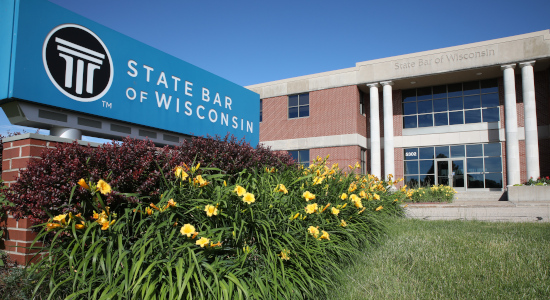
July 13, 2020 – The U.S. District Court for the Eastern District of Wisconsin has dismissed a lawsuit against State Bar of Wisconsin officers and all seven justices on the Wisconsin Supreme Court, a First Amendment challenge to the bar’s mandatory status.
In June, the U.S. Supreme Court declined to hear a similar case that originated in the U.S. District Court for the Western District of Wisconsin, leaving in place Keller v. State Bar of California, 469 U.S. 1 (1990), in which the Court upheld mandatory status/dues.
The State Bar was created by the Wisconsin Supreme Court as a mandatory bar and all lawyers must be members as a condition of practicing law in Wisconsin.
Under Keller (and Wisconsin Supreme Court Rules), the State Bar can collect mandatory dues so long as objecting members are not compelled to fund activities not germane to regulating the legal profession or improving the quality of legal services.
Each year, the State Bar inventories all State Bar activities to determine a Keller dues rebate amount that corresponds to lobbying and other activities deemed not germane to regulating the legal profession and/or improving the quality of legal services. Objecting members can choose to withhold “nonchargeable” dues from their dues payments.
Attorney Schuyler File of Pewaukee filed the Eastern District case against the State Bar, alleging that Supreme Court Rules that require him to join the State Bar as a condition of practicing law in Wisconsin violate his First Amendments rights.
But in File v. Kastner et al., No. 19-C-1063 (June 29, 2020), U.S. District Judge Lynn Adelman granted the State Bar’s and the Wisconsin Supreme Court’s motions to dismiss for failure to state a claim, concluding the complaint is foreclosed by Keller.
Judge Adelman rejected the Supreme Court’s argument that File lacked standing to sue the justices, and also rejected a claim that the justices had immunity from the lawsuit.
But Judge Adelman concluded that File’s lawsuit cannot proceed because Keller still stands, and lower courts cannot overrule U.S. Supreme Court precedent.
The U.S. Supreme Court was recently presented with an opportunity to explicitly overrule Keller, in Jarchow v. State Bar of Wisconsin, noted Judge Adelman.
“Because the Supreme Court passed up this opportunity to explicitly overrule Keller, it is impossible for a lower court to now conclude that the Supreme Court has already implicitly overruled it,” Judge Adelman wrote.
“Indeed, although two Justices dissented from the denial of certiorari in Jarchow, not even they suggested that the Court had already implicitly overruled Keller.”
